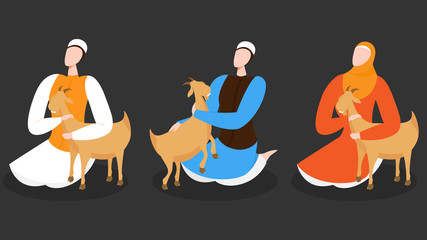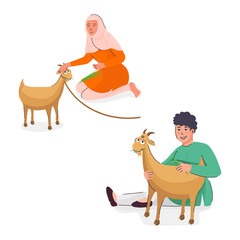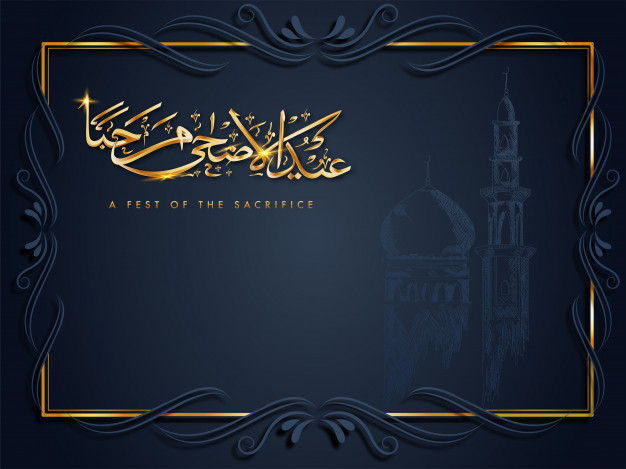
Qurbani, or Uḍḥiya as it is known in Arabic, is the practice of sacrificing an animal for Allah (SWT). Every year, on the days of Eid-ul-Adha from the 10th to 13th of Dhul Hijjah, Muslims around the world sacrifice an animal to mark the completion of Hajj. This practice commemorates the sacrifice of Ibrahim (as) thousands of years ago, who was prepared to sacrifice his beloved son for Allah’s sake. Qurbani is not simply the slaughtering of an animal and the distribution of its meat, and it is more than a commemorative ritual. The word ‘Qurbani’ is derived from the Arabic, ‘qurban’, which has its root in the Arabic word ‘qurb’ – meaning ‘nearness’. The purpose of offering Qurbani is to draw near to Allah. Through Qurbani, we reaffirm what we sometimes forget in the hustle and bustle of everyday life – that we completely submit to Allah, and we are willing to sacrifice whatever is asked of us to be close to Him and gain His pleasure, just as Prophet Ibrahim (as) did so many years ago. Thus, an important part of Qurbani is remembering to hold onto our sincere intentions and striving to be closer to Allah through this symbolic sacrifice.
The story of Qurbani
Ibrahim (AS) experienced a dream in which he was ordered to sacrifice his beloved son Ismail (AS), at first, he was skeptical and believed it was trickery of the cursed devil. After experiencing the dream, the following night, he then understood that it was a message and a command from Allah (SWT).

Without hesitation, he prepared his son for the sacrifice. Ibrahim (AS) loved his son dearly yet this was no obstruction to honoring his duty that was instructed to him by Allah (SWT) and thus proving his full submission to Allah (SWT).

Ibrahim (AS) took his son to the top of Mount Arafat and in his hands, a knife and a rope. Upon Arrival, He mentions the dream to his son Ismail (AS) and made him aware that Allah (SWT) has decreed for him to be a sacrifice and in obedience, his son Ismail (AS) accepted what
was commanded of him.


Ismail (AS) asked that his hands and legs be tied to avoid struggling during the sacrifice and that his father should blindfold himself to avoid witnessing the suffering of his son. Ismail was aware of his father’s love towards him and knew that this would be difficult to witness.

As Ibrahim (AS) began to carry the sacrifice, Allah (SWT) replaced Ismail with a ram, and Ismail (AS) was unharmed. Allah (SWT) tested Ibrahim (AS) to see his dedication in his submission (Islam) to his creator. In his willingness to oblige to Allah (SWT) commands, Ibrahim (AS) successfully passed the test and Qurbani acts as a reminder of our beloved Prophet Ibrahim (AS)dedication and devotion to serving Allah (SWT) obediently, this is the true Islam of oneself that Allah (SWT) expects from us.

After that Ibrahim(AS) conveyed this message to everyone and celebrated the festival of sacrifice and feasted on the ram sent from heaven.


SIGNIFICANCE OF QURBANI
“For every hair of the Qurbani you will receive a reward from Allah, and for every strand of its wool you will receive a reward.” [Al-Tirmidhi]

The rewards for Qurbani is immense as mention in the sunnah and hadith. The most important aspect of Qurbani is the total devotion and submission to Allah (SWT). the word ‘Islam’ meaning submission derives from. To be a devoted Muslim requires forsaking our pride and ego to dedicate ourselves entirely to the will of Allah (SWT). It is through our creator’s guidance that we obtain true success in the Dunya (this world) and the Akhira (the next). Submission is not the only lesson we learn from the story behind Qurbani. Other core lessons vital to the practice of Islam can be examined, such as; unity, piety, mercy, patience.
Who should perform Qurbani and what are the permitted animals?
The general ruling is that Qurbani should be performed by adults of sane mind and affordable means. This means that anybody who meets the threshold for Zakat should be performing Qurbani. However, if you have any doubts, please contact your local Mosque. The animals we slaughter at Qurbani are goats, camels, sheep, and cows. They can be male or female and in good health. Goats and sheep must be at least one year old, and cows must be two.

“Their meat will not reach Allah, nor will their blood, but what reaches Him is piety from you. Thus, have We subjected them to you that you may glorify Allah for that [to] which He has guided you; and give good tidings to the doers of good”. Qur’an [22:37]
The importance of Qurbani lies in the act of it, i.e. the act of worship to Allah which is the essence behind the sacrifice. Allah (SWT) in all his glory is not in need of our charity nor does he need our sacrifice. He wills and we follow, all he needs to say is be and it is. He is the giver of life and the taker and all shall return back to him. Nothing we do benefits Allah (SWT) instead, what Allah (SWT) commands is mercy on us and benefits us. What we sacrifice is feeds our needy from our families, after all, we are all children of Adam (AS) and everyone is our brethren. In addition, we are nurturing our love for the Akhirah and our piety in our good deeds and willingness to obey any command given to us by our creator which in turn, increases our “Iman” and “Taqwa” (Faith and god-fearing). Moreover, we are strengthening our sabr or “patients” which allows to release the love of this world and its short-lived wealth by sacrificing for Allah (SWT) which is in actual fact is a sacrifice for others. Allah (SWT) has given us this opportunity to eliminate our desires and rid ourselves of the clinging on to what is not ours. This is a chance to purify our hearts and should not be missed as it allows us to come closer to our creator. Therefore, to purify our hearts we must purify our intentions so that Allah (SWT) accepts our acts of Qurbani and by strengthening our bonds with the creator, we are strengthening our lives in this world and the next.

Hi! I am a robot. I just upvoted you! I found similar content that readers might be interested in:
https://www.sabarelief.org/what-is-behind-the-story-of-qurbani/
Happy Eid-mubarak.
Eid Mubarak